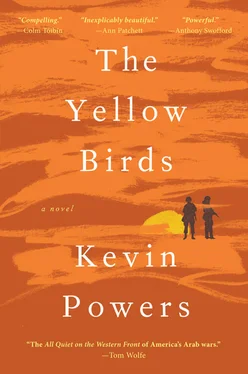After we put his gear in his locker I sat down on a bottom bunk and Murph sat on the one across from me. The room was bright from the sheen of fluorescent paneling above us. The shadeless windows looked out onto night and snow, circles of lamplight and the red brick of other barracks. “Where are you from?” I asked.
“Southwest Virginia,” he said. “What about you?”
“A little shithole town outside Richmond.”
He looked disappointed by my answer. “Hell,” he said, “I didn’t know you was from Virginia.”
Something about that fact irritated me. “Yeah,” I said smugly. “We’re practically related.” I regretted saying it immediately. But I didn’t want to be responsible for him. I didn’t even want to be responsible for myself, but that wasn’t his fault. I began to lay out my gear. “What’d you do down there in the sticks, Murph?” I took a wire brush to all the metallic components of my equipment, the small buttons and the hooks for straps, cleaning off the tarnish and oxidation of lying in the snow while preparing to fight in the desert. As Murph began to answer, the thought crossed my mind that something can only be absurd if enough people take it very seriously. When I looked back over at him, he had started to list facts about himself on the fingers of his small right hand. He hadn’t yet moved to his index finger before pausing. “Yeah, I guess that’s about it. Not much.”
I hadn’t even been listening. I could tell he was embarrassed. He hung his head a little and grabbed his gear from the locker and began to mirror my actions. For a while we were alone. The sound of the wire brushes roughing against green nylon and little pieces of metal settled into the room with a low hum. I understood. Being from a place where a few facts are enough to define you, where a few habits can fill a life, causes a unique kind of shame. We’d had small lives, populated by a longing for something more substantial than dirt roads and small dreams. So we’d come here, where life needed no elaboration and others would tell us who to be. When we finished our work we went to sleep, calm and free of regret.
Days passed. We came closer to our ship-out date, which was still being kept a secret by the higher-ups. But we felt it looming. The war had become a presence in our lives. We were grooms before a marriage. We trained in the snowy fields. We left the barracks in the morning, went to classrooms for briefings on the social structures and demographics of the unnamed towns that we’d be fighting for. We’d leave the classrooms at night with the sun already fallen as if by accident, somewhere to the west beyond the base’s barbwire fencing.
The last week we were in New Jersey, Sterling came to see us in our room. We were packing up all of our gear that we knew we wouldn’t need. The higher-ups had told us we’d have a pass soon and that our families would be able to see us for a last visit before our battalion’s movement. The only thing left was a final range day, put in place as the result of a suggestion Sergeant Sterling had passed up the chain of command. When Sterling stepped through our door, he waved off our somewhat lazy effort to rise to parade rest.
“Sit down, guys,” he said.
Murph and I sat down on my bunk, and Sterling sat down on the bunk across from us, rubbing his temples.
“How old are you two?”
“Eighteen,” Murph answered quickly. “My birthday was last week,” he said, smiling.
I was surprised he hadn’t told me and a little surprised by how young he was. I was twenty-one then, and eighteen had never seemed so young until I heard the number said out loud. I looked at Murph sitting next to me on the bunk. He had a pimple on his chin, but otherwise his skin was smooth. It dawned on me that he’d never even shaved. The soft down on his cheekbones beneath his ears glowed whitely under the panel lights. I heard myself say, “Twenty-one.” And now, as I remember it, I can feel how young I was. I can feel my body before it was scarred. I can reach to my cheek and for a moment remember how the skin was unblemished, then torn, and then healed below my eye like a wadi in miniature. “Twenty-one,” I’d said, and I was as full of time as my body would allow. But looking back from where I am, almost thirty, old enough, I can see myself for what I was. Barely a man. Not a man. Life was in me, but it splashed as if at the bottom of a nearly empty bowl.
And so we looked at Sterling, distraught, and he said, “Fuck,” and I knew that when he told us his age it would not be much more than ours. “All right, look,” he said. “You guys are my guys.”
“Roger, Sarge,” we said.
“Our AO just came down from higher. It’s gonna be a goat fuck. You guys have to promise to do what I say.”
“OK. Sure thing, Sarge.”
“Don’t give me that shit, Privates. No ‘sure thing’ this time. Tell me you’ll do what I say. Every. Fucking. Time.” He beat the notes with his fist into the palm of his left hand.
“We’ll do what you say. We promise,” I said.
He took a deep breath and smiled. His shoulders sagged slightly.
“So, where is it, Sarge?” Murph asked.
“Al Tafar. Up north, near Syria. Like a hajji proving ground up there. Gets real fucking heated sometimes. I wasn’t supposed to tell you yet, but I need you to understand something.” He was slouched beneath the bunk above him. It caused him to lean slightly forward toward us and across the white space of the buffed tile floor.
Murph and I looked at each other and waited for him to continue.
“People are going to die,” he said flatly. “It’s statistics.” Then he got up and left the room.
Somehow I slept, but fitfully. I’d wake from time to time and look out to see how the frost had gathered on the windowpanes. Murph called to me once, in the small hours before daybreak, and asked me if I thought we’d be OK. I kept looking out the window, even though the night had covered it over completely with a small layering of ice. A streetlamp glowed with a pale orange through the opacity. The air was cool and crisp in the room and I pulled my rough wool blanket tight around me. “Yeah, Murph. We’ll be OK,” I said. But I didn’t believe it.
In the morning, before first light, we dragged ourselves over the sides of the company’s deuce-and-a-half trucks and convoyed to the range. The snow had changed to rain overnight and we pulled our hoods over our helmets as far as we could. The rain was cold, percussive. The drops slid down the backs of our blouses and jackets, each one seemingly on the cusp of freezing. No one talked.
When we got to the range, we circled in the grayish snow for our safety briefing. I was tired and had a hard time focusing. The voices of the range cadre barked out through the mist like an unpracticed choir. I watched the rain fall onto the dead leaves, causing a kind of shimmer in the nearly naked branches. The sound of magazines being loaded by the range detail carried over the thin winter air from the dilapidated ammo shed. The white paint peeling off the sides reminded me of a country church I’d passed on my way to school as a boy. The noise emanating from the shed was strange and mechanical and droned in my ears until I couldn’t hear a word the safety officers said. Sterling and Murph had taken their places in line to be rodded onto the range. Sterling glared at me, then cupped his rifle into the crook of his elbow and pointed at his watch. “Waiting on you, Private,” he said.
Sterling was attentive in his marksmanship instruction. Murph and I both had our highest qualification scores ever. Sterling was pleased with us and seemed to be in a good mood. “Anything less than forty out of forty is operator error,” he said. We moved to a small hill that sloped down from the firing line. We relaxed and sat at his feet as he reclined on the hill, oblivious to the snow. “I think y’all might be all right.” For a while we didn’t speak. It was enough to be satisfied with his approval. The sun was still high over the berm at the end of the range when Murph started talking.
Читать дальше












